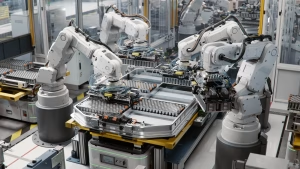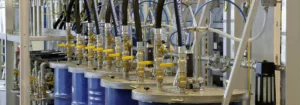Pneumatic Motors Ensuring Optimal Performance and Longevity
Due to their dependability and efficiency, pneumatic motors powered by compressed air are vital components in a wide range of industrial applications. Implementing a proactive and effective maintenance approach is critical for maximizing the lifespan and performance of pneumatic motors. In this post, we look at recommended practices for maintaining pneumatic motors, as well as crucial areas that contribute to their lifetime and good operation.
Inspection and cleaning on a regular basis:
Routine examination is essential for pneumatic motor maintenance. Examine the motor’s exterior and components on a regular basis for signs of wear, damage, or corrosion. Make sure the air intake and exhaust ports are clear of dirt, dust, and other impurities that might impair performance. Cleaning the exterior and interior components of the motor helps prevent dirt buildup, guaranteeing smooth performance and reducing premature wear.
Lubricant:
Proper lubrication is critical in pneumatic motors for decreasing friction and preventing premature wear. Use high-quality lubricants suitable with air motor applications and follow the manufacturer’s recommendations for lubrication schedule. Over-lubrication should be avoided since it might cause extra accumulation and degrade performance. Check and refill lubricant levels on a regular basis to keep the motor’s internal components operating at peak performance.
Maintenance of Filters
The performance of pneumatic motors is dependent on the quality of the air. Installing and changing air filters on a regular basis is an important maintenance activity. Filters keep pollutants out of the motor, guaranteeing clean and dry air throughout operation. Filters that are clogged or unclean can impair efficiency, increase wear, and perhaps harm the motor. To ensure optimal air quality, examine and change filters on a regular basis according to the manufacturer’s recommendations.
Inspection of Seals and Gaskets:
The quality of seals and gaskets is critical for minimizing air leaks and ensuring pneumatic motor performance. Inspect these components on a regular basis for signs of wear, damage, or degradation. Replace any damaged seals or gaskets as soon as possible to minimize air leakage, which can lead to power loss and poor performance.
Temperature Regulation:
Maintaining the proper operating temperature is critical for the longevity of pneumatic motors. Overheating can cause premature wear and decreased efficiency. Check that the motor is running within the temperature range specified. Implement extra cooling techniques, such as fans or heat shields, if necessary, to minimize overheating in high-demand applications or situations.
Calibration of Torque and Speed:
Check and calibrate pneumatic motor torque and speed settings on a regular basis to ensure they satisfy the application’s unique needs. This is especially relevant in precision-driven businesses where accuracy is critical. Calibration on a regular basis helps to minimize overloading, which can lead to excessive wear and premature failure.
Operator Training and Awareness:
Knowledgeable operators are the foundation of proper maintenance. Ensure that all individuals who work with pneumatic motors have received proper training in the manufacturer’s suggested maintenance methods. To develop a proactive maintenance culture, raise operator understanding of the need of frequent inspections, lubrication, and other maintenance chores.
Implementing a complete maintenance program is critical for enhancing pneumatic motor performance and extending their lifespan. By following these best practices, industries can ensure that their pneumatic motors operate at peak efficiency, contributing to a safer, more reliable, and more cost-effective operation. These best practices include regular inspection, proper lubrication, air quality management, seal integrity checks, temperature control, and torque calibration.
For further insights and detailed technical information, consult the Pocket Guide to Air Motors by Atlas Copco or Contact us directly.


